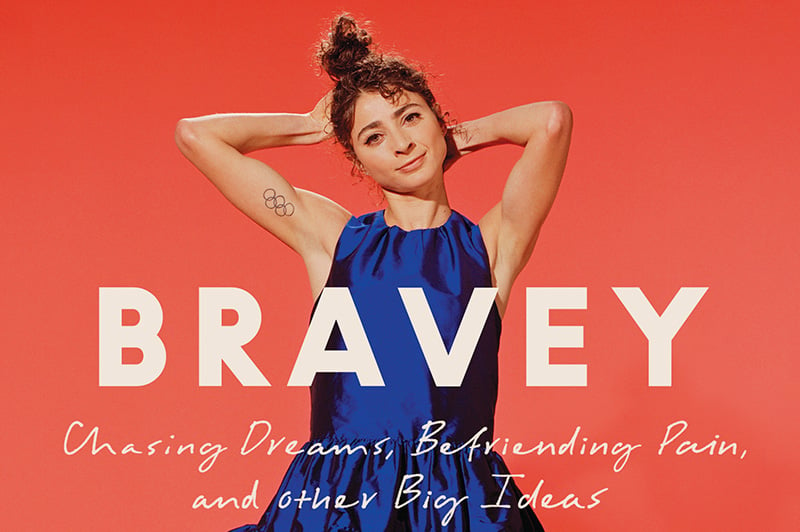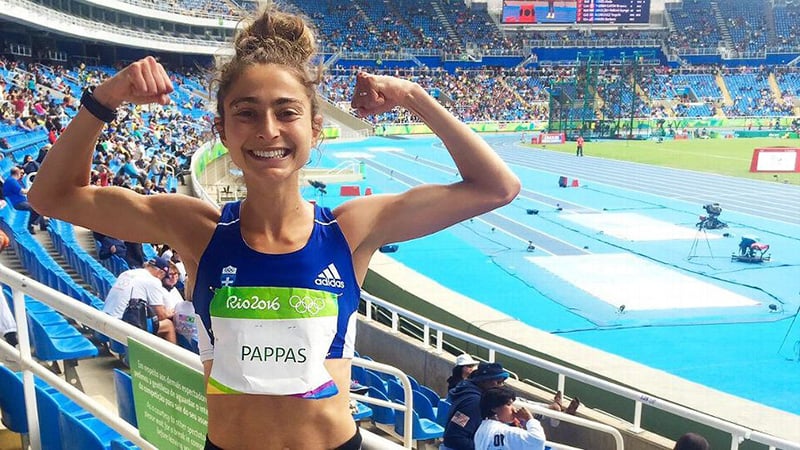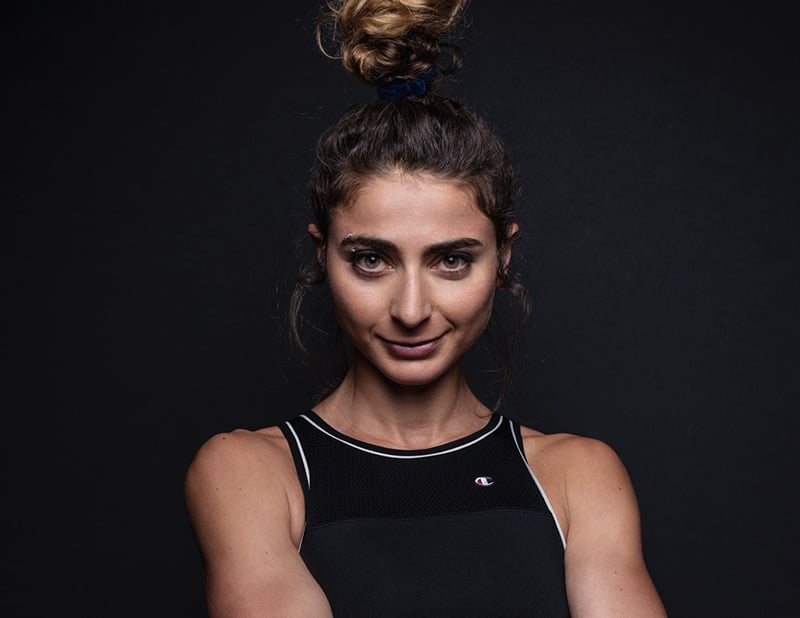
Bravey book cover. Image courtesy Random House.
Alexi Pappas’ first foray into the publishing world, Bravey: Chasing Dreams, Befriending Pain, and Other Big Ideas, opens with an anecdote about her stabbing someone with a pencil while in first grade, then transitions immediately into her mother’s suicide.
“I wasn’t fucking around,” Pappas, MA ’13, writes of stabbing a boy in her class who had made fun of her best friend. That description applies equally to Pappas’ approach to writing Bravey itself, a book that is as emotionally raw and heartbreaking as it is inspiring, challenging, engrossing, and hilarious.
(When the author in question is already an All American-Olympian-Greek national record holder-director-actor at the tender age of 30, a lot of adjectives are necessary to keep up with the multi-hyphenate’s many faces.)
The term “bravey” dates back to Pappas’ time as a graduate student at the UO, where she won three All-America honors and two national titles with the Ducks. Teammate Jordan Hasay, BS ’13 (business administration), herself an 18-time All-American, two-time national champion, and two-time Academic All-American of the Year, recommended Pappas get a Twitter account so she could talk to her fans. The character limit appealed to Pappas, a poetry lover, and in February 2014, after a follower asked her for advice on how to run faster, she replied:
Run like a bravey
Sleep like a baby
Dream like a crazy
Replace can’t with maybe, lady.
“I think ‘bravey’ has this element of choice to it, where some of these other words we maybe don't feel like we're choosing to be,” said Pappas. “We can't just say, ‘I'm choosing to be strong,’ it's sort of a relationship you have with the world, whereas this feels more like a relationship with yourself. And that, I think, is empowering, it is optimistic, it gives opportunity for some agency. A word like that would have really helped me when I was younger and looking for female mentorship, growing up without my mom just trying to figure out what I could expect of myself as a woman one day. That word feels very, very useful.”
The term took off, and is now just as much a Pappas signature as her trademark bun. And while ‘bravey’ was gaining popularity online, Pappas was soaring in the real world.

Alexi Pappas broke the Greek 10,000-meter record during the 2016 Olympic Games in Rio. Photo courtesy Alexi Pappas.
In 2016, she broke the Greek national 10,000 meter record twice, the second time during the Olympic Games in Rio. She then decided to become a marathoner—because when you’ve conquered 6.2 miles, why not add another 20 to your racing distance?—and moved to California to train. In 2018, she (deep breath) started the Book Club Track Club podcast with middle distance runner and fellow bookworm Kyle Merber, married college sweetheart Jeremy Teicher, wrote the Olympic Dreams screenplay with Teicher and Nick Kroll (The Kroll Show, The League) and filmed it in the Olympic village during the Winter Olympics in PyeongChang, South Korea, and made her marathon debut in the Chicago Marathon.
Oh, and she wrote a book.
Pappas came up with the idea for Bravey shortly before the 2016 Olympics, and wrote it over the following two years. On light training days, or in the days following a major race where she’d relax and let her body recover, she replaced soles-to-soil with pen-to-paper and poured her heart out on the page.
“I knew that I really loved the idea of writing a book of essays, which means that the book has more of an emotional arc rather than a straight narrative arc,” said Pappas. “I like that, because it’s the kind of book I like to read, honestly.
“A real pleasure was to figure out how to craft a book that can communicate in words the kind of experiences that I've had, because I think it’s one thing to live a certain kind of life, but it’s another thing to be able to describe it in a way where people feel like they’re experiencing it with you.”
The end result, Bravey: Chasing Dreams, Befriending Pain, and Other Big Ideas, was released in January 2020 to much fanfare. CNN anchor Jake Tapper recommended it. As did actress Mindy Kaling. And Olympic medalist Shalane Flanagan. And the UOAA (we’re doing it right now).
Bravey is an unflinchingly honest look back through the highs and lows of Pappas’ life. The highs have been lived on a global stage: Olympic Dreams is her second film, after 2016’s Tracktown; her wedding to Teicher was covered by the New York Times; the Greek record holder in the 10k is now, with the Tokyo Olympics on the horizon, less than a minute off the Greek marathon record.
But Pappas tackles the lows, largely hidden in private until now, with the same intensity with which she tackles a run or a workout. Her mother’s mental health struggles, multiple suicide attempts, and eventual death are laid bare for all to see, as are Pappas’ quests for mentors, struggles to secure an apparel deal to help pay the bills, and her own battles with depression and suicidal thoughts, which consumed her after she returned from Rio.

Alexi Pappas portrait. Image courtesy JoAnna Forsythe.
“On the Oregon coast with Jeremy, all I wanted to do was jump off the jagged cliffs and die in the ocean,” Pappas writes at one point. “I thought everything and everyone would be better off that way. To be suicidal is to live in a perpetual “grass is greener” state of mind, where you’re convinced by the illusion that everything you are not is better than what you are, including being alive.”
It is in the book’s darkest moments where Pappas really shines, because Bravey isn’t just an autobiography from an outrageously talented athlete/actor/writer, it’s also a road map to redemption. Pappas writes about how therapy helped her, and how she learned to think of her brain as something that could be injured and healed, just like a hamstring. Her frank approach to writing about the issues she faced, and how she recovered—in part by applying ‘replace can’t with maybe’ to her own life when her therapist told her to start by changing her actions—make the book more than just a good read. It’s a tool that could be critically useful to someone who finds themselves in a similar situation.
“I hope that people will feel like they have another satellite teammate in me,” said Pappas, “and also a vocabulary to see their situation, whatever it is, wherever they started, and wherever they want to go, a little bit differently. I think that that's my greatest contribution. I've been to these peaks like the Olympics and some of the top film festivals, but I've also been to the valleys, with my post-Olympic depression, and I think it means that I have the ability to communicate about an experience and I think I've found words that have helped me in my journey, shifting how I see things, and they've saved my life. In the ‘Depression’ chapter, you'll see a simple shift of vocabulary to understanding that my brain was a body part actually saved my life, and I think it could have really helped my mom, and I hope that it helps other people.
“I'm proud that I wrote something that really feels like my best work. If somebody finds the book they will love it. I'm proud that I know that people will get something out of it, whether it's the mental health piece, or the mentorship, or just some sort of shift in vocabulary, I just know that everybody will get something wonderful and new out of the book, and I hope that it finds the people who might enjoy it.”
- by Damian Foley, UO Communications

